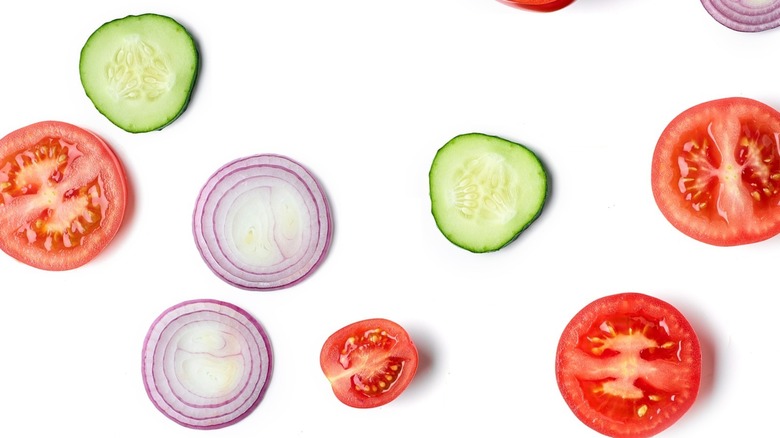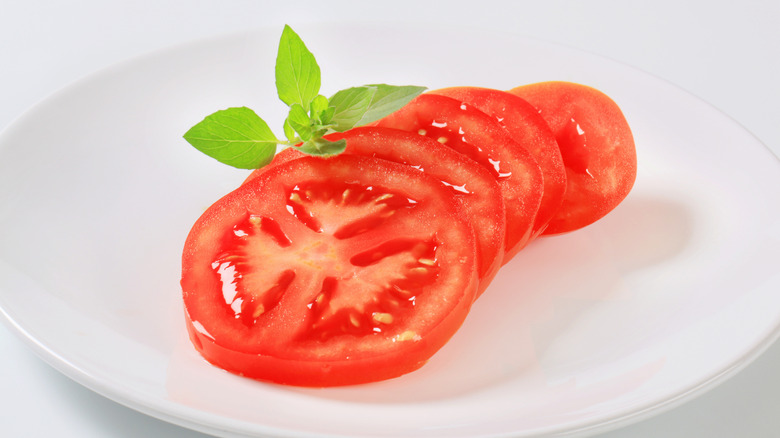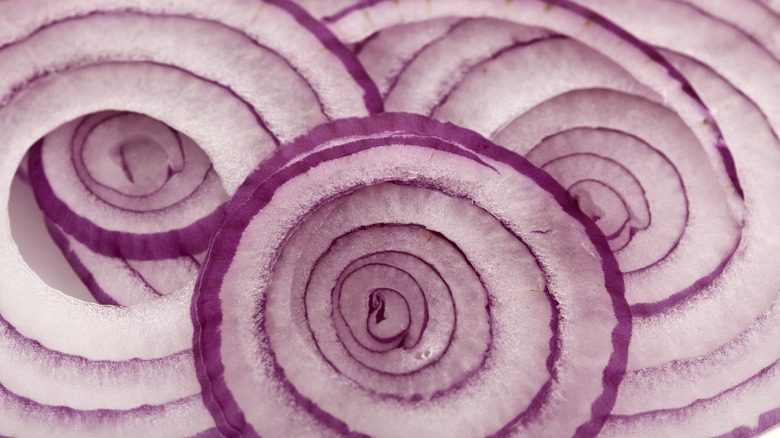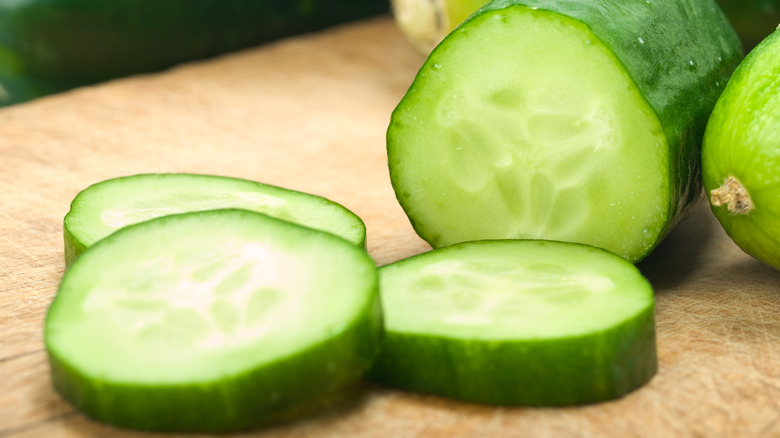The Right Way To Store Sliced Tomatoes, Onions, And Cucumbers
Tomatoes, cucumbers, and onions are a Holy Trinity of sorts for salads. They'll liven up almost any plate of greens with flavor and crunch, and can even upgrade a classic like green bean and tomato panzanella salad. But as exquisite as all three are, they are also finicky foods and if you don't store them properly they can spoil in just a day or two.
Fresh produce has a notoriously short shelf life to begin with but its staying power declines even more once you cut them. The USDA warns against leaving sliced produce out at room temperature for any more than two hours, calling instead for the fridge and an airtight container. While that sounds easy enough, tomatoes, onions, and cucumbers each have certain properties that make them a bit tricky to store. Luckily, once you know what their vulnerabilities are, safely packing up your salad fixings is a cinch.
Sliced tomatoes keep in the fridge but not for long
When it comes to fresh tomato storage, you typically want to avoid the refrigerator at all costs. This is because it contains an enzyme that breaks down the fruit's cell membranes when exposed to cold air. This turns the tomato bland and gradually reduces its texture to a mushy, mealy mess. These fruits are also notorious for absorbing the odors of other items in the fridge. You should always store whole tomatoes at room temperature but once you cut them open the rules change.
If you leave a cut version out at room temperature, it will dry out and shrivel up, so you have no choice but to put it in the fridge. You can use an airtight container to minimize the damage but even then, the refrigerator will start to degrade the tomato's texture and flavor as soon as you put it in there, so you should use the leftovers within two days (sooner is always better). Ideally, you should only cut as many slices from this fruit as you need for that very moment and store the remaining portion of it in one piece, with the cut side covered by plastic wrap.
Minimize odor when storing onions
Keeping whole onions in the fridge is one of the most common storage mistakes that are ruining your food but once again, the rules change when you cut them up. Sliced versions should be stored in the refrigerator, however, you need to be mindful about managing the odor. Onions are like the opposite of tomatoes in that rather than absorbing the odors of foods around them, they infect other items with their odor.
An airtight container or resealable bag will help to contain the smell and you can double down by placing cut pieces of these bulbs in a plastic bag and then placing that bag in an airtight container for maximum protection. It is best to use a glass container since plastic can absorb the smell of the onion. There are also containers specifically designed to store alliums in the fridge, which either twist or snap shut for an airtight seal.
Stored like this, sliced onions will last about one week in the fridge. For longer-term storage, up to a few months, you can freeze them but they will lose their crispness when thawed, so it's best to use frozen varieties for cooked purposes and not as a raw garnish.
Cucumbers are sensitive, so wrap them up tight
Unlike tomatoes and onions, cucumbers should always be stored in the refrigerator since they spoil within two days at room temperature. Sliced cucumbers are even more delicate than whole tomatoes, so it's especially important to get them in the fridge ASAP. That said, they are also sensitive to extreme cold which means it's best to store them near the front of the refrigerator or in a crisper drawer. The biggest issue you'll face in storing sliced cucumbers is moisture loss, which will ruin the texture.
To prevent this, place your leftover sliced versions in a container and cover them with water. Then seal the container and place it in the fridge. Cucumbers should last up to a week this way and it helps to change the water every two days or so. They should also generally be kept away from other produce.
Many fruits, including apples, avocados, bananas, and tomatoes, produce ethylene gas, which makes cucumbers ripen and spoil faster. That's one more reason that storing them underwater in an airtight container is so important. Even then, it's safest to keep them away from these ethylene-emitting fruits as well as items with strong odors, such as onions and garlic, which the mild-tasting cucumber can easily absorb.



